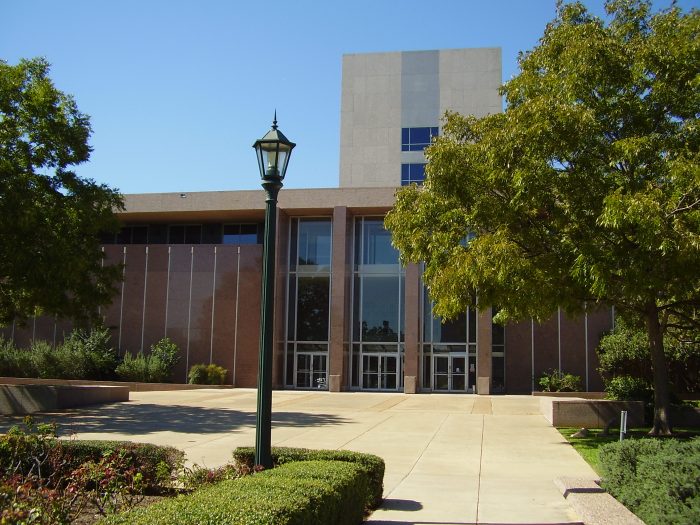In Brooklyn DA office, Marc J. Fliedner heads up anti-drug push
After New York’s Legislature enacted same-sex marriage earlier this year, Marc J. Fliedner and other attorneys and staff in the Brooklyn District Attorney’s office went to the Sheraton Brooklyn to celebrate. They were joined by Charles J. Hynes, the district attorney himself.
“He came over to the Sheraton and raised a glass and a toast and wished us the happiness that he’s had in 50-some odd years of marriage,” Fliedner said during an interview in his office.
That is a very different experience than working in Monmouth County, New Jersey, heading a sex crimes prosecution unit from 1992 to 2001. Fliedner had a wife and two children and was working in law enforcement, which can be less than accepting of homosexuality.
“My participation in this career probably made it both harder and sadder that I couldn’t come out,” said Fliedner, now 49. “I would have to say that I see a significant difference in that now. This is an office where you can thrive being in my position.”
It helps that Fliedner is in Brooklyn. If a prosecutor can be described as progressive, then that would be Hynes. His office offers alternatives to prison programs for drug users and has a re-entry program for inmates returning from incarceration that has reduced recidivism. Working with the state courts, it has established special courts, such as drug and domestic violence courts. The Family Justice Center, a unit within the District Attorney’s office, aids domestic violence victims.
Hynes has regularly marched in Brooklyn’s Gay Pride Parade and has been very public in cases that concern the queer community. He had the highest profile among numerous elected officials who spoke out about the 2006 killing of Michael Sandy, a gay man, and he was out front on the prosecution of the killers of José Sucuzhanay, an Ecuadorian man who was mistaken for gay and beaten to death in 2008. The defendants Hynes’ office prosecuted in those cases are in prison.
Fliedner began his legal career in 1987 in the Brooklyn District Attorney’s office right after graduating from law school. He departed for Monmouth County in 1992 and then had a private practice in New Jersey from 2001 to 2006. He represented people who had been sexually assaulted as children and were suing the institutions where the assaults took place. In 2006, he returned to Brooklyn.
“It wasn’t Brooklyn and it wasn’t Joe Hynes,” Fliedner said of Monmouth County. “I thought, ‘Could I come back and work comfortably out as a prosecutor?’ I will say that that has worked out tremendously well because he is somebody who is just, and he clearly respects my work and my work ethic.”
Working for a district attorney who has a reputation for not tolerating assistants who lose cases, Fliedner eventually joined the homicide unit, which was a return to one of the macho areas of law enforcement.
“There’s no question that homicide has always been the bastion of testosterone in a DA’s office,” Fliedner said. “It was sort of an interesting sociological experiment when I went in as a definitively out prosecutor.”
Most recently, he was promoted to executive assistant district attorney and chief of the Major Narcotics Investigations Bureau. That job brings Fliedner’s career back to managing, something he was doing in Monmouth County and an aspect of the job that he missed. He has 17 attorneys and investigators working for him, plus other staff. It also keeps him prosecuting felony cases.
“Other than homicides, this is really one of the only venues where you are looking at A1 felony sentencing situations,” Fliedner said.
His unit does not run small buy and bust operations.
“The objective is that dealing on either community complaints or intelligence that is generated through law enforcement sources, we are trying to attack a whole enterprise and its various layers — and by virtue of that, have a higher impact,” Fliedner said.
While the trade in narcotics is certainly less visible than it once was in New York City and seemingly less of a concern to the public, there remain places in Brooklyn where it thrives.
“They’re not as serious as they were back in the day, back in the ‘80s perhaps, driving everything, but there are still pockets of activity in certain communities in Brooklyn where there is a lot of cocaine and heroin trafficking,” Fliedner said.
Arrests for possessing small amounts of marijuana have driven arrests in America’s so-called war on drugs, and that has drawn objections from progressive groups. For Fliedner, the people who run marijuana sales are not benign.
“There is a very booming and profitable marijuana trade which brings with it… a really violent element,” he said. “Most often, where we’re seeing guns in association with organized narcotics activity, it’s in the marijuana sales. It’s more lucrative, it’s faster turnover, and there is more of a motivation for people to maintain their turf.”
The new position keeps Fliedner in the work that he most enjoys.
“I love being a prosecutor,” he said. “I love being a law enforcement official.”



































